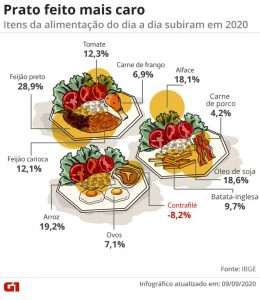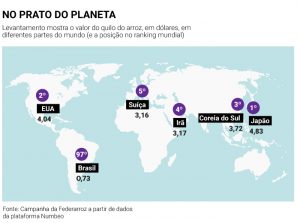As a result of the attack on Iran, nitrogen fertilizer at the port of New Orleans has seen an increase in price this week. Urea prices for barges in New…
Food Inflation Rose Sharply in Brazil- Highlighted by Rice and Soy Oil
The price of food has increased significantly in Brazil. The Broad Consumer Price Index (IPCA) rose 2.44% in 12 months, while food inflation rose 8.83%. More specifically, the price of rice increased 19.2% in 2020, and soy oil rose 18.6%, in the same period.
G1 writers Paula Salati and Rikardy Tooge reported that a contributing inflationary factor is the dollar appreciation in the Brazilian exchange rate, which stimulated exports and reduced domestic supply. In addition, coronavirus assistance helped to stimulate food consumption at home.

Globo Rural writer Cleyton Vilarino pointed to five variables impacting the price of rice in Brazil.
(1) Smaller production: in the last decade, the planted area in the country has dropped 58%, from 2.9 million hectares to 1.7 million hectares in 2019/2020.
(2) Higher consumption: the Covid-19 pandemic led to increased consumption at home.
(3) Lower stocks: public stocks of rice reached the lowest level for September since 2010.
(4) Exports: the reduction in exports in Asian countries opened the opportunity for high international prices and for Brazil to expand its exports by 73.6% from January to August.
(5) Lower incentives in the field: less than 30% of farmers have stocks to take advantage of record off-season prices while production costs have increased by 10.5%.
Item básico da alimentação dos brasileiros, produto acumula valorização de 117% no campo e já é vendido por até R$ 40 o pacote de 5 kg no varejohttps://t.co/iyQrP4uUWk
— Globo Rural (@Globo_Rural) September 11, 2020
Last Wednesday, the Brazilian Chamber of Foreign Trade (Camex) decided to zero the import tax rate for rice by December 31 of this year. The Common External Tariff (TEC) is 12% for processed rice and 10% for paddy rice outside Mercosur. The temporary reduction is restricted to the quota of 400 thousand tons. The measure was proposed by the Ministry of Agriculture.
#Números | #Arroz
— Ministério da Agricultura (@Mapa_Brasil) September 11, 2020
O arroz nosso de cada dia foi um dos assuntos da semana, mas foi acompanhado de muita informação equivocada. Veja nestes números da @Conab_Oficial sobre o que ocorreu com o produto nos últimos 10 anos. pic.twitter.com/1k8Dvf8C6q
Valor Econômico writers Mariana Ribeiro e Rafael Walendorf reported that the increase in product prices in supermarkets has created pressure on the federal government. The article added that the impact of the zero tax will be small, since the exemption will end before the beginning of the next harvest in Brazil.
Governo zera taxa de importação de arrozhttps://t.co/qGp53zNHTC
— Valor Econômico (@valoreconomico) September 10, 2020
In an interview with Canal Rural, the executive director of the Brazilian Association of the Rice Industry (Abiarroz), Andressa Silva, said that the impact of the suspension of the tariff on the price may not be immediate:
“We cannot say that prices will fall. On the other hand, the zero rate for imports can prevent prices from rising further.”
On Thursday, the Minister of Agriculture, Tereza Cristina, addressed the population about the supply of rice in the country. In a video on social networks, she said the product will continue to be available to Brazilians. She explained that rice production has had problems in the past, with falling product prices and a reduction in the production area.
Muitas pessoas estão comentando sobre o preço do arroz e a possibilidade de desabastecimento. Fiquem tranquilos, não há risco de faltar arroz. Quanto ao preço,informo que o valor deverá recuar, em breve,com as medidas tomadas pelo @govbr @jairbolsonaro. O @Mapa_Brasil está atento pic.twitter.com/Te3GuY87bN
— Tereza Cristina (@TerezaCrisMS) September 10, 2020
Brazil must import rice from the United States and Thailand to contain the high prices in the domestic market. According to the Minister of Agriculture, the products sold by these countries are of the “same type of rice that Brazilians have a habit of consuming.”

Even with the recent price peak, associations of producers noted that the product remains very accessible to Brazilian consumers. The Federation of Rice Associations of the Rio Grande do Sul state (Federarroz-RS) made a campaign on social networks to show the prices difference between countries, according to an item by journalist Gisele Loeblein at GauchaZH. In world rankings, Brazil is in the 97th position, with US$ 0.73 per kilo.





